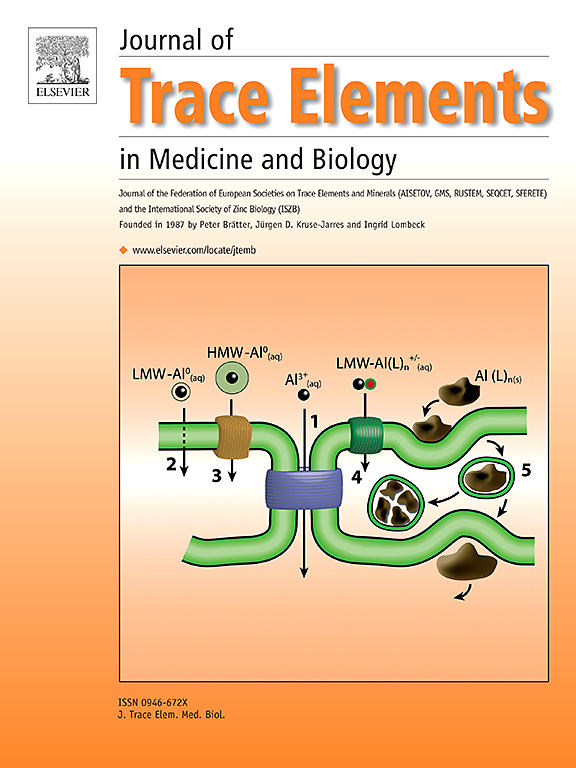Minimizing neonatal hypothyroidism induced by lithium exposure through breast milk
IF 3.6
3区 医学
Q2 BIOCHEMISTRY & MOLECULAR BIOLOGY
Journal of Trace Elements in Medicine and Biology
Pub Date : 2025-04-12
DOI:10.1016/j.jtemb.2025.127653
引用次数: 0
Abstract
Background
Lithium-induced hypothyroidism in the neonate is a growing concern for lactating mothers. Maternal hypothyroidism in the postpartum period could lead to hypothyroidism in the infant via maternal compromised thyroid hormones (likely T4) in breast milk, and lithium in breast milk could have a direct effect on the neonatal thyroid axis over lithium carbonate direct administration.
Methods
We have studied the effects of lithium exposure on neonatal pups through two different modes of exposure: direct oral administration of lithium carbonate and indirect exposure of lithium from breast milk from dams. Furthermore, dams were supplemented with two different iodine dosages in both control and lithium-treated groups. We employed Enzyme-linked immunosorbent assay, inductively coupled plasma mass and atomic absorption spectrometry to assess hormone profiles and intrathyroidal elemental content.
Results
Interestingly, lithium administered directly to pups from control mothers (average dose 900 mg/50 kg per day), did not affect their weight, thyroid hormones, blood urea, and intrathyroidal iodine content despite traces of lithium found in their blood and thyroid. The iodine pathway in the presence of lithium content in both thyroid follicular cells and lactocyte has been hypothesized. The results also demonstrate that lithium administration in lactating dams alters thyroid hormones (T4) and blood urea in both dams and pups, which could be reversed by iodine supplement. The mechanism for supplemented iodine uptake in the presence of lithium is hypothesized.
Conclusion
In future, supplementing iodine may be potentially useful in clinical practices to address the neonate concerns of lactating mothers and their infants either caused by prolonged lithium medication or maternal iodine deficiency.
尽量减少通过母乳接触锂引起的新生儿甲状腺功能减退
锂诱发的新生儿甲状腺功能减退是哺乳期母亲日益关注的问题。产后母亲甲状腺功能减退可通过母乳中母亲甲状腺激素(可能是T4)的降低导致婴儿甲状腺功能减退,而母乳中的锂可能比碳酸锂直接给药对新生儿甲状腺轴有直接影响。方法通过直接口服碳酸锂和间接从母鼠母乳中接触锂两种不同的暴露方式,研究了锂对新生儿的影响。此外,在对照组和锂处理组中,水坝都补充了两种不同剂量的碘。我们采用酶联免疫吸附法、电感耦合血浆质量和原子吸收光谱法来评估激素谱和甲状腺内元素含量。结果有趣的是,尽管在对照母鼠的血液和甲状腺中发现了微量锂,但直接给它们喂食锂(平均剂量为每天900 mg/50 kg)并没有影响它们的体重、甲状腺激素、血尿素和甲状腺内碘含量。存在锂含量的甲状腺滤泡细胞和乳细胞中的碘途径已被假设。结果还表明,在哺乳期公犬中添加锂会改变公犬和幼犬的甲状腺激素(T4)和血尿素,而补充碘可以逆转这一变化。在锂的存在下补充碘摄取的机制是假设的。结论补充碘可能在临床实践中有潜在的作用,以解决哺乳期母亲及其婴儿因长期服用锂或母亲缺碘引起的新生儿问题。
本文章由计算机程序翻译,如有差异,请以英文原文为准。
求助全文
约1分钟内获得全文
求助全文
来源期刊
CiteScore
6.60
自引率
2.90%
发文量
202
审稿时长
85 days
期刊介绍:
The journal provides the reader with a thorough description of theoretical and applied aspects of trace elements in medicine and biology and is devoted to the advancement of scientific knowledge about trace elements and trace element species. Trace elements play essential roles in the maintenance of physiological processes. During the last decades there has been a great deal of scientific investigation about the function and binding of trace elements. The Journal of Trace Elements in Medicine and Biology focuses on the description and dissemination of scientific results concerning the role of trace elements with respect to their mode of action in health and disease and nutritional importance. Progress in the knowledge of the biological role of trace elements depends, however, on advances in trace elements chemistry. Thus the Journal of Trace Elements in Medicine and Biology will include only those papers that base their results on proven analytical methods.
Also, we only publish those articles in which the quality assurance regarding the execution of experiments and achievement of results is guaranteed.

 求助内容:
求助内容: 应助结果提醒方式:
应助结果提醒方式:


